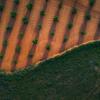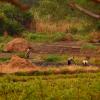News

26 July 2024
Navigating new horizons to protect human and planetary health

14 June 2024
IIASA Leadership visits Washington DC

05 June 2024
The 2024 State of CDR Report: Scaling up CO2 removal to meet Paris Targets
Focus

08 July 2024
Future food demand in The Gambia: can increased crop productivity and climate adaptation close the supply–demand gap?
The Gambia faces significant food availability issues due to low agricultural productivity. IIASA researchers and colleagues used the FABLE Calculator to explore actions to reduce the food supply-demand gap by 2050. The results, published in Food Security, reveal that current cropland will not meet food demand by 2050.

28 June 2024
Launching a scientific career: The impact of the YSSP experience
Every year, the IIASA Young Scientists Summer Program (YSSP) hosts around 50 young scientists for three months over the course of the summer to undertake a scientific project within the scope of their PhD on a topic related to the IIASA research agenda. In this Q&A, Carolien Kroeze, current Rector Magnificus of Wageningen University and 1991 YSSP participant, recounts her IIASA experience.